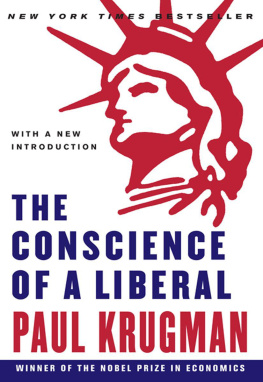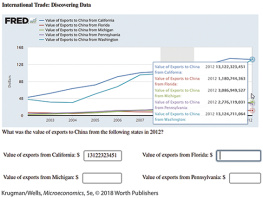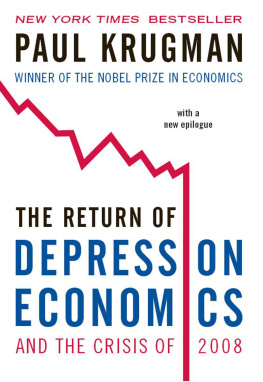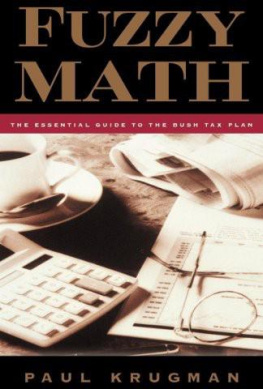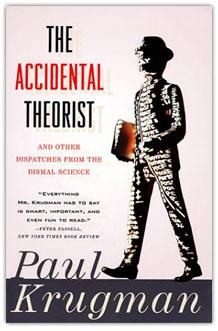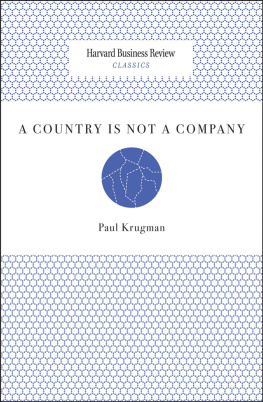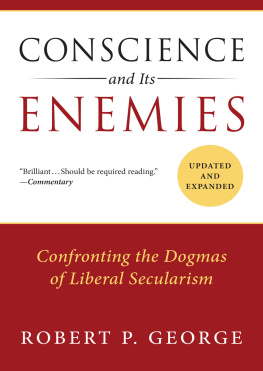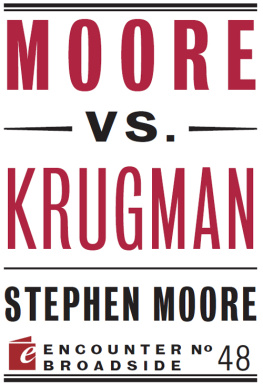Paul Krugman - The Conscience of a Liberal
Here you can read online Paul Krugman - The Conscience of a Liberal full text of the book (entire story) in english for free. Download pdf and epub, get meaning, cover and reviews about this ebook. year: 2009, publisher: W. W. Norton & Company, genre: Science. Description of the work, (preface) as well as reviews are available. Best literature library LitArk.com created for fans of good reading and offers a wide selection of genres:
Romance novel
Science fiction
Adventure
Detective
Science
History
Home and family
Prose
Art
Politics
Computer
Non-fiction
Religion
Business
Children
Humor
Choose a favorite category and find really read worthwhile books. Enjoy immersion in the world of imagination, feel the emotions of the characters or learn something new for yourself, make an fascinating discovery.
- Book:The Conscience of a Liberal
- Author:
- Publisher:W. W. Norton & Company
- Genre:
- Year:2009
- Rating:5 / 5
- Favourites:Add to favourites
- Your mark:
- 100
- 1
- 2
- 3
- 4
- 5
The Conscience of a Liberal: summary, description and annotation
We offer to read an annotation, description, summary or preface (depends on what the author of the book "The Conscience of a Liberal" wrote himself). If you haven't found the necessary information about the book — write in the comments, we will try to find it.
The Conscience of a Liberal — read online for free the complete book (whole text) full work
Below is the text of the book, divided by pages. System saving the place of the last page read, allows you to conveniently read the book "The Conscience of a Liberal" online for free, without having to search again every time where you left off. Put a bookmark, and you can go to the page where you finished reading at any time.
Font size:
Interval:
Bookmark:
The Age of Diminished Expectations
Peddling Prosperity
Pop Internationalism
The Accidental Theorist
The Return of Depression Era Economics
Fuzzy Math
The Great Unraveling
Paul Krugman
THE CONSCIENCE OF A LIBERAL

W. W. Norton & Company New York London
Copyright 2007 by Paul Krugman
All rights reserved
For information about permission to reproduce selections from this book,
write to Permissions, W. W. Norton & Company, Inc.,
500 Fifth Avenue, New York, NY 10110
ISBN: 978-0-393-06069-0
W. W. Norton & Company, Inc.
500 Fifth Avenue, New York, N.Y. 10110
www.wwnorton.com
W. W. Norton & Company Ltd.
Castle House, 75/76 Wells Street, London W1T 3QT
To my parents
I was born in 1953. Like the rest of my generation, I took the America I grew up in for grantedin fact, like many in my generation, I railed against the very real injustices of our society, marched against the bombing of Cambodia, went door to door for liberal political candidates. Its only in retrospect that the political and economic environment of my youth stands revealed as a paradise lost, an exceptional episode in our nations history.
Postwar America was, above all, a middle-class society. The great boom in wages that began with World War II had lifted tens of millions of Americansmy parents among themfrom urban slums and rural poverty to a life of home ownership and unprecedented comfort. The rich, on the other hand, had lost ground: They were few in number and, relative to the prosperous middle, not all that rich. The poor were more numerous than the rich, but they were still a relatively small minority. As a result, there was a striking sense of economic commonality: Most people in America lived recognizably similar and remarkably decent material lives.
The equability of our economy was matched by moderation in our politics. For most but not all of my youth there was broad consensus between Democrats and Republicans on foreign policy and many aspects of domestic policy. Republicans were no longer trying to undo the achievements of the New Deal; quite a few even supported Medicare. And bipartisanship really meant something. Despite the turmoil over Vietnam and race relations, despite the sinister machinations of Nixon and his henchmen, the American political process was for the most part governed by a bipartisan coalition of men who agreed on fundamental values.
Anyone familiar with history knew that America had not always been thus, that we had once been a nation marked by vast economic inequality and wracked by bitter political partisanship. From the perspective of the postwar years, however, Americas past of extreme inequality and harsh partisanship seemed like a passing, immature phase, part of the roughness of a nation in the early stages of industrialization. Now that America was all grown up, we thought, a relatively equal society with a strong middle class and an equable political scene was its normal state.
In the 1980s, however, it gradually became clear that the evolution of America into a middle-class, politically middle-of-the-road nation wasnt the end of the story. Economists began documenting a sharp rise in inequality: A small number of people were pulling far ahead, while most Americans saw little or no economic progress. Political scientists began documenting a rise in political polarization: Politicians were gravitating toward the ends of the left-right scale, and it became increasingly possible to use Democrat and Republican as synonyms for liberal and conservative. Those trends continue to this day: Income inequality today is as high as it was in the 1920s, and political polarization is as high as it has ever been.
The story of rising political polarization isnt a matter of both parties moving to the extremes. Its hard to make the case that Democrats have moved significantly to the left: On economic issues from welfare to taxes, Bill Clinton arguably governed not just to the right of Jimmy Carter, but to the right of Richard Nixon. On the other side its obvious that Republicans have moved to the right: Just compare the hard-line conservatism of George W. Bush with the moderation of Gerald Ford. In fact, some of Bushs policieslike his attempt to eliminate the estate taxdont just take America back to the way it was before the New Deal. They take us back to the way we were before the Progressive Era.
If we take a longer view, both the beginning and the end of the era of bipartisanship reflected fundamental changes in the Republican Party. The era began when Republicans who had bitterly opposed the New Deal either retired or threw in the towel. After Harry Trumans upset victory in 1948, the leadership of the GOP reconciled itself to the idea that the New Deal was here to stay, and as a matter of political self-preservation stopped trying to turn the clock back to the 1920s. The end of the era of bipartisanship and the coming of a new era of bitter partisanship came when the Republican Party was taken over by a radical new force in American politics, movement conservatism, which will play a large role in this book. Partisanship reached its apogee after the 2004 election, when a triumphant Bush tried to dismantle Social Security, the crown jewel of the New Deal institutions.
There have, then, been two great arcs in modern American historyan economic arc from high inequality to relative equality and back again, and a political arc from extreme polarization to bipartisanship and back again. These two arcs move in parallel: The golden age of economic equality roughly corresponded to the golden age of political bipartisanship. As the political scientists Nolan McCarty, Keith Poole, and Howard Rosenthal put it, history suggests that there is a kind of dance in which economic inequality and political polarization move as one. They have used a sophisticated statistical technique to track the political positions of members of Congress. Their data show the Republicans moving left, closer to the Democrats, when income inequality declined, producing the bipartisanship of the fifties and sixties. Then the Republicans moved right, creating todays bitter partisanship, as income inequality rose. But what makes the dancing partners stay together?
One possibility is that inequality takes the leadthat, to change metaphors, the arrow of causation points from economics to politics. In that view the story of the last thirty years would run like this: Impersonal forces such as technological change and globalization caused Americas income distribution to become increasingly unequal, with an elite minority pulling away from the rest of the population. The Republican Party chose to cater to the interests of that rising elite, perhaps because what the elite lacked in numbers it made up for in the ability and willingness to make large campaign contributions. And so a gap opened up between the parties, with the Republicans becoming the party of the winners from growing inequality while the Democrats represented those left behind.
That, more or less, is the story I believed when I began working on this book. Theres clearly something to it. For example, a close look at the campaign to repeal the estate tax shows that it has largely been financed by a handful of families with huge estates to protect. Forty years ago there werent many huge estates, and the countrys superrich, such as they were, werent rich enough to finance that kind of campaign. So thats a case in which rising inequality has helped pull Republicans to the right.
Yet Ive become increasingly convinced that much of the causation runs the other waythat political change in the form of rising polarization has been a major cause of rising inequality. That is, Id suggest an alternative story for the last thirty years that runs like this: Over the course of the 1970s, radicals of the right determined to roll back the achievements of the New Deal took over the Republican Party, opening a partisan gap with the Democrats, who became the true conservatives, defenders of the long-standing institutions of equality. The empowerment of the hard right emboldened business to launch an all-out attack on the union movement, drastically reducing workers bargaining power; freed business executives from the political and social constraints that had previously placed limits on runaway executive paychecks; sharply reduced tax rates on high incomes; and in a variety of other ways promoted rising inequality.
Font size:
Interval:
Bookmark:
Similar books «The Conscience of a Liberal»
Look at similar books to The Conscience of a Liberal. We have selected literature similar in name and meaning in the hope of providing readers with more options to find new, interesting, not yet read works.
Discussion, reviews of the book The Conscience of a Liberal and just readers' own opinions. Leave your comments, write what you think about the work, its meaning or the main characters. Specify what exactly you liked and what you didn't like, and why you think so.

